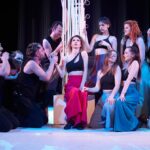24 October | 18:30 – Bulandra Theatre Bucharest, Liviu Ciulei Hall (Izvor)

“The theatre is like an antique agora, even when we laugh or deeply enjoy ourselves at a comedic performance, we can reflect collectively on serious topics.” ( Matei Vișniec)
[same_day_events_link]
By: Matei Vișniec
Cast:
Corifeul: Horia Veriveș
Lysistrata, Glykeria: Diana Roman
Calonice, Melina: Andrea Boboc
Myrrhine, Eleni: Mălina Lazăr
Lampito, Angeliki: Ada Lupu
Husband of Lysistrata: Ionuț Cornilă
Husband of Calonice: Cosmin Maxim
Husband of Myrrhine: Dumitru Năstrușnicu
Husband of Lampito: Răzvan Conțu
Messenger, Marc Vondervil: Constantin Pușcașu
Journalist: Livia Iorga
Old Lysistrata, Emilia Ferventès: Pușa Darie
Female choir: Ioana Aciobăniței, Mara Bărbărie, Diana Furnică, Ana-Maria Țidulă, Alexandra Budău
Male choir: Andrei Sava, Dumitru Georgescu, Radu Homiceanu, Răzvan Bujor, Sebastian Pricop
Apparitions on video: Marian Stavarachi, Emil Coșeru, Oana Sandu, Diana Vieru, Fabian Toderică, Haruna Condurache, Anastasia Toderișen, Marian Chiculiță, Doru Aftanasiu
Directed by: Zalán Zakariás
Set design: Andra Bădulescu Vișniec
Choreography: Alice Veliche
Original music: Hunor-Lehel Boca
Musical training: Diana Roman
Video design: Andrei Cozlac
Filming: Andrei Botnaru
Camera operator: Constantin Dimitriu
Producer: Vasile Alecsandri National Theatre, Iași
Duration: 1h 50 min (no intermission)
Recommended age: 16+
Performance in Romanian with English surtitles
In Lysistrata, mon amour, Matei Vișniec initiates an exchange of ideas with Aristophanes, not without polemic overtones. The playwright takes up the central character and his theme (the plea against war and the “sexual strike” of women) as he investigates the consequences of a utopian, still very tempting scenario. Good quality humour is interwoven with serious reflections on questions such as: What is the use of war? Is peace a guarantee of happiness or just a stage during the transition to yet another conflict? Is there a real evolution from the people of 2,500 years ago, or has humanity essentially remained unchanged? (the NTF curators’ motivation)
Photo credits: George Popovici







